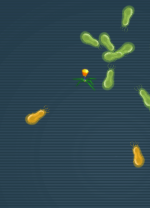Difference between revisions of "Research"
(→Research Types) |
(→Mutation Results) |
||
| Line 112: | Line 112: | ||
Mutating Bacteria with similar effects gives a better chance to obtain a good result. | Mutating Bacteria with similar effects gives a better chance to obtain a good result. | ||
| − | Mutation results are calculated by taking the average values of Bacteria A and Bacteria B. | + | Mutation results are calculated by taking the average values of Bacteria A and Bacteria B, so Bacteria with better effects usually give better results. |
Even though higher level Bacteria generally have better effect, it is possible to mutate a Bacteria with weaker bonuses, especially if A and B are of different '''rarities'''. | Even though higher level Bacteria generally have better effect, it is possible to mutate a Bacteria with weaker bonuses, especially if A and B are of different '''rarities'''. | ||
Revision as of 14:46, 30 April 2018
-
- Research is a way of generating resources, earning and upgrading Evolved Bacteria, and improving Bacteria production.
- Most research types require some amount of time to be completed and use Scientists, which are returned to the player after completion.
- New research types can be unlocked by destroying planets.
Contents
Modifiers
Most research actions are influenced by the reduced research time modifier, which is obtained from various Dark Matter Institute technologies and equipped Evolved Bacteria.
Other bonuses and modifiers are usually specific to a particular research type, such as Sleeper Agents, which increase the max limit of planetary research discoveries.
Research Types
There are seven research types.
With the exception of Bacteria Irradiation, all of them are unlocked by Planet 9. Bacteria Irradiation is unlocked only after 5 planets past the first Black Hole.
Bacteria Evolution
Bacteria Evolution is the first research center available in the game.
Each Bacteria Evolution research type has a chance to discover one Level 1 Evolved Bacteria. In case of unsuccessful evolution, the player will earn regular Bacteria.
In the case of unsuccessful evolution, the amount of regular Bacteria earned equals current BPS multiplied by the research duration in seconds and a random number in the range from 0.05 to 0.2.
Only one type of Bacteria Evolution can be researched at a time.
Colony Irradiation
Colony irradiation is unlocked after destroying Earth.
Successful irradiation doubles the production of a random colony. Unsuccessful irradiation yields some Bacteria. One colony can be irradiated multiple times.
It is only possible to irradiate colonies that you have purchased at least once before. If every colony has been purchased at least once, then each colony has the same probability of being irradiated. Irradiation is capped to 400 for each colony.
The irradiation effect is not lost when entering a Black Hole or attacking a planet.
Only one irradiation type can be researched at a time.
| Success rate | Duration | Scientists | |
|---|---|---|---|

|
10% | 01:00:00 | |

|
30% | 06:00:00 | |

|
50% | 12:00:00 | |

|
75% | 24:00:00 | |

|
100% | 24:00:00 | |

|
70% | 08:00:00 | |

|
100% | 06:00:00 |
Main page: Colony Irradiation
Bacteria Mutations
The ability to mutate Evolved Bacteria is unlocked after destroying 4 planets.
Mutation requires two Bacteria of equal level and always gives one Bacteria of a higher level as a reward. The rarity of the mutated Bacteria is the same as the rarity of the used Bacteria. If they are of different rarities, the mutated Bacteria will have a random rarity in the same range, so it is not possible to obtain a higher rarity Bacteria through mutation.
Mutation is instantaneous and it requires no Scientists. However, after it is complete, the player has to clean the lab before it can be again used for mutations. Cleaning takes 2 hours and requires 2 ![]()
The default mutation cap is Level 3, which can be raised to Level 4 with the Ultimate Life Form tech at the Dark Matter Institute.
Mutation Results
- When calculating the mutation results, the effects of Bacteria A and Bacteria B play an important role.
Mutating Bacteria with similar effects gives a better chance to obtain a good result.
Mutation results are calculated by taking the average values of Bacteria A and Bacteria B, so Bacteria with better effects usually give better results.
Even though higher level Bacteria generally have better effect, it is possible to mutate a Bacteria with weaker bonuses, especially if A and B are of different rarities.
In most cases, Bacteria C will have the effects as either Bacteria A or Bacteria B. The exception is when C has more stats than A and B individually.
The name of C is random and does not depend on Bacteria A and B.
See also: Evolved Bacteria
Nanobot Production
Nanobot production is unlocked after destroying 5 planets.

Only one Nanobot production type can be active at a time.
It's possible to instantly complete an active Nanobot production by paying some Diamonds.
The newly produced Nanobots appear on the main screen in real time. By clicking on a Nanobot, you gain an extra Nanobot for free, which is displayed as the Nanobot splitting into two yellow Nanobots.
The yellow Nanobots cannot be split any further.
Planetary Research
Planetary Research is unlocked after destroying 6 planets.
Planetary Research is the primary way to obtain new minerals and it also offers various bonuses for attacks on the current planet and Bacteria production.
Main page: Planetary Research
Bacteria Recycling
Bacteria recycling lets you sacrifice unneeded Evolved Bacteria to obtain a random reward. It is unlocked after destroying the 9th planet - Xutrutis.
Upon recycling a Bacteria, 9 to 25 cards appear on the screen.
When a card is selected, it flips over, revealing the reward. After the first reward is received, the player can select up to one additional card from the remaining set by paying ![]() 5
5
The recycling rewards are divided into four tiers with each tier consisting of up to seven different rewards. The possible reward tiers and the number of cards displayed are determined by the bacteria value coefficient (BVC). The recycling rewards in events can be different from the regular game.
Bacteria Recycling is the only Research Lab that doesn't directly require Scientists.
Main page: Bacteria Recycling
Bacteria Irradiation
Bacteria irradiation is unlocked when the player has destroyed five planets after the first Black Hole.
Irradiation can increase the Black Hole Survival Probability of one selected Evolved Bacteria. Each irradiation raises the probability by 5% and requires 1 hour and 1 Scientist to complete.
The default survival probability cap is 30%. It can be raised to 90% by researching Hazard Elimination and other technologies at the Dark Matter Institute.















